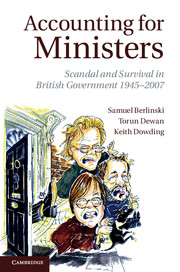Book contents
- Frontmatter
- Contents
- List of figures
- List of tables
- Preface and acknowledgements
- 1 Introduction
- 2 Managing the cabinet: principal–agent relations in government
- 3 The structure of British government
- 4 Who serves in government and how long do they last?
- 5 The prime minister and cabinet
- 6 Performance measures and forced exits
- 7 Ministerial performance and tenure
- 8 Conclusion
- References
- Index
4 - Who serves in government and how long do they last?
Published online by Cambridge University Press: 05 April 2012
- Frontmatter
- Contents
- List of figures
- List of tables
- Preface and acknowledgements
- 1 Introduction
- 2 Managing the cabinet: principal–agent relations in government
- 3 The structure of British government
- 4 Who serves in government and how long do they last?
- 5 The prime minister and cabinet
- 6 Performance measures and forced exits
- 7 Ministerial performance and tenure
- 8 Conclusion
- References
- Index
Summary
The units of analysis in this book are ministers, in particular British ministers and the length of time that they serve in their posts. Why should we think of the length of time that British ministers serve in their posts as an important political variable? The starting point of our analysis is that British ministers are essentially career politicians. Becoming a minister represents the pinnacle of political careers that may have begun several decades earlier. Once ministers attain such high position they are in general reluctant to return to the back benches. Our analysis of political careers in the UK complements similar studies carried out on the careers of US Congressmen. Amongst these studies, Groseclose and Krehbiel (1994) look at the decisions of politicians in the 102nd Congress to retire when faced with a one-off ‘golden parachute’, and Diermeier, Keane and Merlo (2005) provide a more general framework within which to study how pecuniary and non-pecuniary incentives affect the career choices of US politicians. Recently, the financial post-career rewards of British politicians have been studied by Eggers and Hainmueller (2009), and Merlo, Galasso, Landi and Mattozzi (2010) provide detailed evidence of the career choices of Italian legislators from 1945–2008.
Our focus is on a particular variable of interest: conditional upon the length of government in which they serve we ask whether the background characteristics of ministers affect their length of service.
- Type
- Chapter
- Information
- Accounting for MinistersScandal and Survival in British Government 1945–2007, pp. 54 - 86Publisher: Cambridge University PressPrint publication year: 2012



